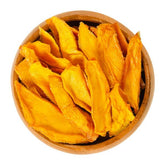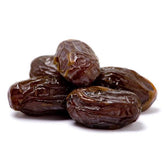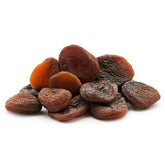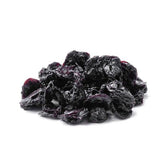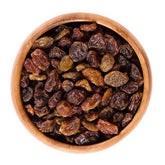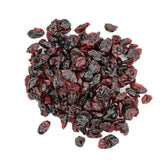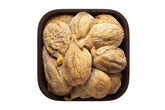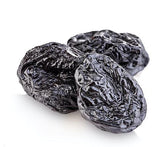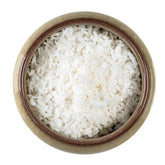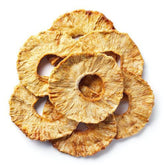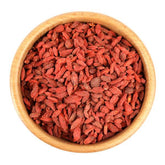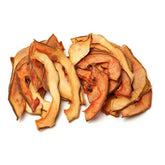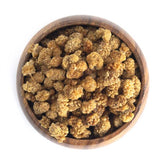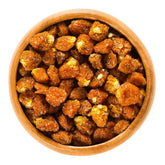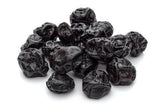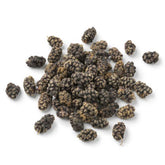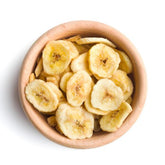Dried Fruit
Dried fruit is a healthy and convenient way to nourish your body while on the go. All of the dried fruit products we carry are certified organic & non-GMO, wheat-free, sulfite-free, and contain no preservatives. Whenever possible we ordered directly from the organic farms where they are grown and dried.
If you are looking for a dried fruit that is not listed on our website, please contact us and we will do our very best to source it for you.
For more information about dried fruit in general, please continue reading below.
NUTRITION FACTS
- Dried fruit is basically a fruit that has had all its water content removed when dried. The fruit shrinks leaving a small package that’s chock full of nutrients. Compared to fresh fruit, dried fruit can carry up to 3.5 times the amount of fiber, vitamins, and minerals by weight which includes folate, potassium, magnesium, iron, and calcium.
- Dried fruit is also packed with groups of different antioxidants including polyphenols, flavonoids, and carotenoids. Health benefits associated with these antioxidants include reduced oxidative damage, positively impact DNA repair, improve blood flow, better digestive health, prevent and reduce inflammation, boost brainpower, and improve immune function.
POTENTIAL HEALTH BENEFITS OF DRIED FRUIT
Health benefits will vary by the dried fruit being consumed, but in general it's the fibre and antioxidant content that provide health benefits.
Here some of the benefits that have been found in various studies:
- Boosts colon health. Dried fruit, especially prunes, contain both insoluble and soluble fiber. The insoluble fiber in prunes is more effective at improving stool frequency and consistency than psyllium husk, a bulk-forming laxative. Soluble fiber in dried fruits are prebiotics that act as food for the good bacteria in your gut which contributes to improved digestive health. In addition, sorbitol-a sugar alcohol in prunes — can have laxative effects in some people.
- Improves overall diet. An observational study found that those who eat dried fruit consume more nutrients and fewer fats, alcohol, and added sugars than those who do not.
- Encourages weight loss. The aforementioned study also found that those who ate dried fruits weighed less than those who did not.
- Keeps you satiated. One study found that children who ate a snack of raisins before a meal consumed less food than those who had grapes as a pre-meal treat. This can be true for other dried fruits as well because of the high fiber content.
- Improves blood sugar control. Dried fruits, like raisins, dates and prunes are low to medium on the glycemic index meaning that they should not spike blood sugar after eating. This is partly due to their high fiber and natural fructose content. But also, antioxidants found in grape skins and other dried fruits protect the pancreas against inflammation and oxidative stress. Insulin is produced in the pancreas.
- Reduces risk of cardiovascular disease. Consuming dried fruit has been associated with reducing blood pressure. Also, the phenolic antioxidants in dried fruits have been associated with decreasing inflammatory markers and lowering VLDL (“bad”) cholesterol.
LET’S TALK ABOUT SUGARS
Naturally occurring sugars
- Not only are all the nutrients condensed in dried fruit compared to fresh fruit, but so are the naturally-occurring sugars including glucose and fructose. Too much sugar from any food can contribute to many diseases. So it’s important to eat dried fruits in moderation. A great way to do this is to incorporate them with other nutritious foods to enhance the dish. Combine them with nuts in a trail mix or add to salads.
- If you are trying to cut back on carbs and sugars (I’m looking at you, my ketogenic or keto-curious friends), don’t assume dried fruit isn’t for you. Dried coconut is the dried fruit for you. Per 28g serving, there are 7g of carbs, but 5g of those carbs are fiber and only 2g are naturally occurring sugars.
Fruit-juice sweetened
- Some dried fruits may be sweetened to preserve and balance flavour. While some dried fruits add high fructose corn syrup, refined sugars or artificial sweeteners, our organic dried cranberries and blueberries are sweetened with organic apple juice.
Candied fruit (added sugars)
- Dried fruit with added sugars are considered “candied” fruit. Seeing as how most dried fruits have concentrated naturally-occurring sugars, adding refined sugars, high fructose corn syrup, or artificial sweeteners would cancel all the nutritional benefits. Added sugar has been shown to have harmful effects on health. This includes increasing the risk of obesity, heart disease and even cancer.
- This is why none of the products we carry have added sugars!
LET’S TALK ABOUT SULFITES
All of the dried fruit we carry is sulfite-free. Sulfites are a preservative that some producers add to their dried fruit to prevent discolouration and make them look more appealing. It is usually applied to brightly coloured dried fruits like apricots and raisins. Some people have a sensitivity to sulfites which can present with symptoms like stomach cramps, skin rashes, and asthma attacks.
HOW TO ENJOY
- On their own! Great for an on-the-go snack.
- Include them in your favourite trail mix.
- Add them to a smoothie, cereal, yogurt, or pancakes in the morning.
- Sprinkle them onto fruit-, vegetable-, or grain-based salads.
- Incorporate them into desserts.
- Use them in spreads, jams, and chutneys.
- Add to cookies, muffins, and other baked goods.
If you’re feeling more culinarily adventurous, try using them in savoury dishes like chicken or turkey stuffing, chicken tagine, meatloaf, or empanadas (stuffed meat pastries).
Remember the California Raisins? Those R&B-singing claymation raisins grooving to “I Heard It Through the Grapevine”? Raisins were arguably the most popular dried fruit back in the day. However, just look at the wide selection that we carry today. We have pineapple, goji berries, zante currants, and even chocolate-covered golden berries. It’s time to expand you’re dried fruit palate and maybe even discover some new favourites!
FAQ
Q: Which of the dried fruit you carry is sun-dried?
A: Turkish apricots, Turkish figs, and sultana raisins
Q: Does dried fruit require refrigeration?
A: We recommend refrigeration of some of the dried fruit with higher moisture content such as prunes and apricots. Most of the other dried fruit can be stored in the pantry for 3 months.
Q: My Turkish figs have a white (moldy?) coating on the outside, are they bad?
A: No! This is simply the natural sugars from within the figs moving to the surface. They are still delicious and safe to eat!
Q: Do any of your dried fruits contain oil?
A: Our Sultana/Thompson/Zante raisins, dried blueberries, and cranberries contain less than 1% organic sunflower oil to prevent them from clumping.
Q: Can I use dried fruit in baking recipes?
A: Yes! Raisins, currants, and apricots are additions to many recipes:
Q: Can dried fruit be re-hydrated?
A: Many types of dried fruit can be re-hydrated, such as Mango, goji berries, golden berries, pineapple, papaya, and more!
Q: Why some of the organic dried fruits not colorful as conventional varieties?
A: Conventional dried fruit is treated with sulfites to preserve its colors. Sulfite consumption is not ideal, which is why we make sure none of the products we carry contain any. Apricot, mango, and pineapple are a few of the most noticeable when it comes to color differences.
Q: Can I buy your dried fruit in bulk/do you offer wholesale discounts?
A: Yes! If you are in terested in ordering larger quantities, please contact us.


